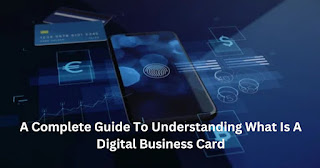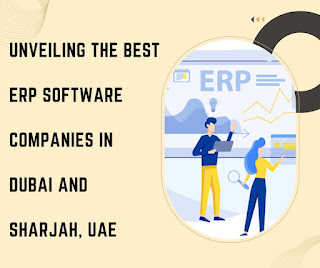A Complete Guide To Understanding What Is A Digital Business Card
Introduction
The digital revolution has brought about significant changes
in all aspects of our lives, and the traditional business world is no
exception. One such innovative product of this revolution is the digital
business card, a modern, eco-friendly substitute for physical business cards.
This article aims to provide a comprehensive understanding of what digital
business cards are, their benefits, how to create and use them, and their outlook.
What Is A Digital Business Card?
A digital business
card is an online means of sharing contact information. Unlike the
traditional paper cards, digital business cards are not physical objects but
rather virtual information packages. They contain similar information as their
paper counterparts, such as your name, job title, contact information, company
logo, and website link, but they are designed for digital use.
How Do Digital Business Cards Work?
Digital business cards work by employing a simple sharing
mechanism that enables you to share your information digitally with others.
They can be shared through email, social media, and even via QR codes. Once the
recipient gets your digital card, they can contact you directly by tapping on
the contact information embedded in the card.
Contents of a Digital Business Card
The contents of a digital business card are generally the
same as those of a traditional physical card, but they can be expanded to
include a wider array of information due to the flexibility and interactive
potential of the digital format. Here's what you can include in a digital
business card:
- Basic
Personal Details: This includes your name, job title, and the company
you work for.
- Contact
Information: Your phone number, email address, and physical address
(if relevant). Some digital business cards also allow you to add
direct-call or email links, so the person can immediately call or email
you by clicking on the number or address.
- Company
Logo: To enhance brand recognition, you should add your company logo.
- Website
and Social Media Links: One of the advantages of digital business
cards is that you can link directly to your or your company's website,
LinkedIn profile, Facebook page, Twitter handle, or other social media
platforms.
- Photo:
Adding a professional photo can help recipients to remember you better.
- QR
Code: Including a QR code can allow for quick and easy sharing and
saving of your contact details.
- Professional
Summary or Tagline: A brief description of your business or
professional profile can be included to give the recipient a clearer
understanding of what you do.
- Visual
Elements: You can also incorporate visual elements like color schemes,
fonts, and backgrounds to align with your brand's image.
- Call-to-Action
Buttons: With interactive buttons, you can encourage the recipient to
take specific actions, such as 'Call Now', 'Email', or 'Visit Website'.
- Embedded
Video or Portfolio: If you're in a creative field, you might include a
link or embedded video showcasing your work or portfolio.
- VCard:
Some digital business cards offer the option to include a VCard, which
allows the recipient to download and save your contact information
directly to their phone or computer.
- Calendaring
Functionality: Some advanced digital business cards also offer
calendaring functionality that allows people to schedule a meeting with
you directly from the card.
By customizing your digital business card with these
contents, you can make it a comprehensive, interactive tool that not only
provides your contact information but also showcases your professional persona
effectively.
Who Can Use Digital Business Cards?
Digital business cards are versatile tools that can be used
by anyone who needs to share professional contact information. They are
especially useful for people who frequently network or interact with new
clients, partners, or colleagues. Here's a non-exhaustive list of who can use
digital business cards:
- Entrepreneurs
and Business Owners: Entrepreneurs can use digital business cards to
present a modern, professional image and make it easier for potential
clients, investors, or partners to get in touch.
- Freelancers:
Freelancers can use digital business cards to share their contact
information along with a portfolio of their work, attracting potential
clients.
- Sales
and Marketing Professionals: For those in sales and marketing, digital
business cards can be a powerful tool to impress potential clients,
providing a seamless way to share information and follow up on leads.
- Networking
Professionals: People who frequently attend networking events,
conferences, or trade shows can use digital business cards to exchange
contact details easily and efficiently.
- Job
Seekers: Digital business cards can be used by job seekers to share
their professional profiles, resumes, or LinkedIn profiles with potential
employers.
- Professionals
in Creative Fields: Artists, designers, photographers, writers, and
other creative professionals can use digital business cards to showcase
their portfolio or creative work.
- Consultants
and Coaches: Consultants and coaches can use digital business cards to
share their services, testimonials, and booking links with potential clients.
- Academics
and Researchers: Academics can use digital business cards to share
their research, publications, or projects.
- Non-profit
Organizations: Non-profit professionals can use digital business cards
to share their mission, projects, and donation links.
- Real
Estate Agents: Real estate agents can use digital business cards to
provide easy access to current listings, testimonials, and booking
viewings.
This list is by no means exhaustive; virtually anyone can
benefit from using a digital business card. They offer a contemporary,
eco-friendly, and efficient way to share professional information, making them
a valuable tool for professionals in the digital age.
Creating A Digital Business Card
Several online platforms and applications allow users to
create digital business cards. The process typically involves the following
steps:
- Register
on the platform.
- Choose
a template or design your card from scratch.
- Add
your professional details, including your name, company name, job title,
contact information, etc.
- Customize
the design by adding logos, color schemes, images, or fonts that align
with your brand.
- Save
your digital business card.
- Share
it via email, social media, or through a QR code.
How To Use A Digital Business Card
The usability of digital business cards is virtually
limitless. They can be used in all the scenarios where traditional business
cards are used and more. You can share them during virtual meetings, add them
to your email signature, or embed them on your website. When attending a
physical meeting or event, you can share them via a QR code.
Advantages Of Digital Business Cards
- Eco-Friendly:
In our increasingly environmentally-conscious society, digital business
cards reduce the demand for paper, thus promoting sustainability.
- Versatility:
They can include not just text, but also images, embedded buttons and
links, making your digital business card an interactive portal.
- Easily
Updated: If your contact information changes, you can easily update
your digital business card without having to reprint hundreds of paper
cards.
- Cost-Effective:
They eliminate printing and distribution costs associated with traditional
business cards.
- Wide
Reach: They can be shared with anyone, anywhere, as long as they have
internet access.
- No
Physical Storage Required: They do not take up any physical space and
can't be lost or damaged.
- Analytics:
Some digital business card platforms offer tracking and analytics so you
can see when and how often your card is viewed.
The Future Of Digital Business Cards
As businesses are increasingly migrating to digital
platforms, the use of digital business cards is expected to rise. The
convenience and flexibility they offer are attractive to modern professionals
who value efficiency and environmental responsibility. They will continue to
evolve with advances in technology, offering even more functionalities and
conveniences.
Conclusion
In an era where digital transformation is the norm, digital
business cards represent the future of professional networking. They are cost-effective,
versatile, and sustainable - aligning perfectly with the modern business ethos.
Embracing this innovation will not only modernize your business networking
approach but also elevate your professional image, helping you to stand out in
today's competitive digital marketplace.




Comments
Post a Comment